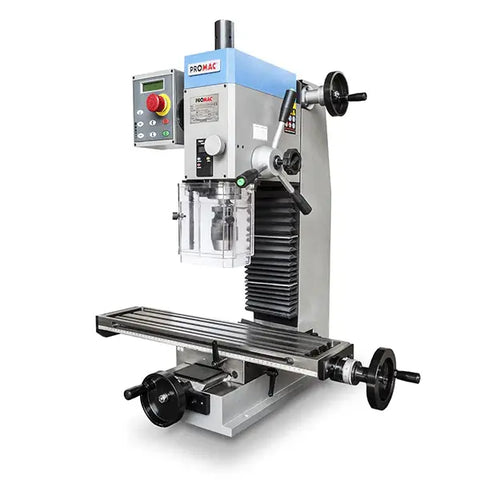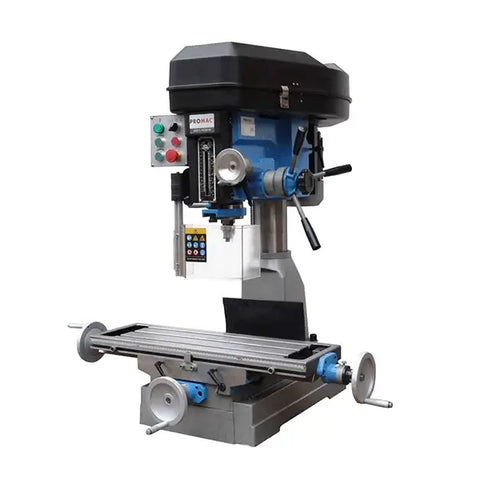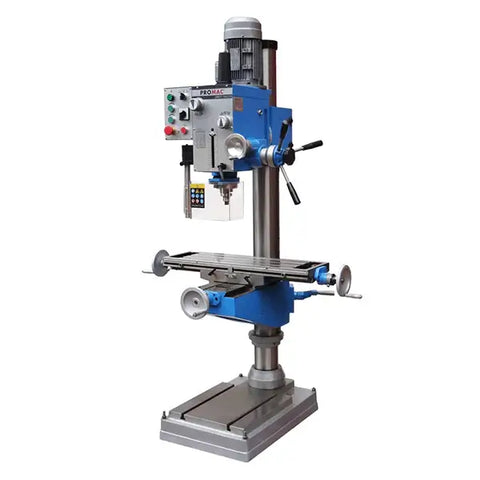
Milling Machine Uses: Crafting Precision Parts
In the world of manufacturing, precision is key. Whether you're working with metal or any other material, the ability to craft intricate parts with accuracy and consistency is crucial. This is where milling machines come into play. These powerful tools are used in various industries to create precision parts, shaping and cutting materials to perfection.
When it comes to milling machines, there are a few key functions that make them indispensable in the world of manufacturing. Firstly, they allow for precise material removal. Whether it's removing excess material or creating complex shapes, milling machines offer the flexibility and control needed to achieve the desired result. Secondly, these machines can perform a range of cutting operations, from drilling to contouring, making them incredibly versatile.
One of the most common applications of milling machines is in metalworking. From automotive manufacturing to aerospace engineering, these machines are used to shape and cut metal with precision. With their ability to handle various types of metal and produce intricate designs, milling machines play a vital role in creating high-quality components for industries that demand nothing less than perfection.

Key Takeaways:
- Milling machines are essential for crafting precision parts in various industries.
- They offer precise material removal and a wide range of cutting operations.
- Milling machines are particularly important in metalworking, allowing for the creation of intricate designs.
- These machines are crucial for industries that demand high-quality components.
- From automotive to aerospace, milling machines play a vital role in shaping the modern world.
Milling Machine Applications in Industry
In various industries, milling machines are extensively used for shaping and cutting materials like metal and plastic. From automotive manufacturing to aerospace engineering, these machines play a crucial role in ensuring precision and efficiency in the production process.
Automotive Manufacturing
In the automotive industry, milling machines are employed to create precision parts for vehicles. From engine components to chassis parts, these machines enable the production of high-quality and accurately shaped parts that meet the demanding requirements of the automotive sector.

Aerospace Engineering
When it comes to aerospace engineering, milling machines are an indispensable tool. These machines are used to craft intricate components such as turbine blades, airframes, and landing gear. The precision and reliability of milling machines are vital in ensuring the safety and performance of aircraft.
Electronics Industry
In the electronics industry, milling machines find application in the production of intricate circuit boards and electronic components. The ability to accurately shape and cut materials is crucial in creating miniature components that power various electronic devices.
Plastic Manufacturing
Milling machines are also utilized in the plastic manufacturing industry for creating molds and shaping plastic parts. The machines enable manufacturers to produce complex shapes and designs with precision, resulting in high-quality finished products.
CNC Milling Machines
Advancements in technology have led to the development of Computer Numerical Control (CNC) milling machines. These machines use computer programming to control the cutting operations, allowing for highly customized and complex operations. CNC milling machines are used across industries where precision and intricacy are paramount.
| Industry | Applications |
|---|---|
| Automotive | Engine components, chassis parts |
| Aerospace | Turbine blades, airframes, landing gear |
| Electronics | Circuit boards, electronic components |
| Plastic Manufacturing | Molds, shaped plastic parts |
The Importance of Precision Milling Machines
Precision is key when it comes to crafting intricate parts, and milling machines offer the accuracy and consistency required for such tasks. In industries where tight tolerances and flawless results are paramount, precision milling machines play a critical role. Whether it be for medical devices or electronic components, these machines ensure that every detail is crafted with perfection.

The Role of Precision in Manufacturing
In the world of manufacturing, precision is essential. From aerospace to automotive industries, the demand for high-quality, precisely engineered parts is ever-growing. Achieving such precision requires advanced machinery capable of intricate operations.
Milling machines are designed to accomplish precisely that. With their precise movements and cutting abilities, they can create complex shapes and contours with utmost accuracy. The use of high-quality tools and cutting techniques ensures that parts meet strict specifications and tolerances.
The Benefits of Precision Milling Machines
Utilizing precision milling machines brings a myriad of benefits to industries that rely on accurate, flawlessly crafted parts.
- Consistency: Precision milling machines consistently deliver uniform results, ensuring the same level of accuracy in each part produced.
- Efficiency: By eliminating human error and enhancing automation, precision milling machines streamline the manufacturing process, reducing production time and costs.
- Versatility: These machines can work with a wide range of materials, such as metals, plastics, and composites, catering to diverse manufacturing needs.
- Flexibility: Precision milling machines can be programmed to execute complex cutting paths, enabling the production of intricate parts with ease.
The Industries That Benefit from Precision Milling Machines
A wide range of industries rely on precision milling machines to meet their specific needs for accurate and intricately crafted parts:
| Industry | Applications |
|---|---|
| Automotive | Engine components, transmission parts, chassis |
| Aerospace | Aircraft components, turbine blades, structural parts |
| Medical | Implants, surgical instruments, prosthetics |
| Electronics | Circuit boards, connectors, housings |
| Tooling | Moulds, dies, cutting tools |
These are just a few examples of industries that heavily rely on precision milling machines to achieve the required levels of accuracy and ensure the production of high-quality parts that meet stringent standards.
Conclusion
To conclude, milling machines play a crucial role in modern manufacturing processes. Their versatility and precision make them indispensable tools for crafting high-quality parts in various industries. Whether you work in automotive, aerospace, or any other sector that requires precise components, a milling machine offers a wide range of uses that can meet your needs.
Milling machines excel in shaping and cutting materials with utmost accuracy, ensuring that every detail is crafted flawlessly. From intricate medical devices to intricate electronic components, these machines deliver the consistency and precision required to meet the tight tolerances demanded in these industries.
With their ability to work on different materials, such as metals and plastics, milling machines provide a flexible solution for a multitude of applications. Whether you need to create complex shapes, drill holes, or produce intricate cuts, a milling machine can handle the task efficiently and effectively.
Whether you are a small-scale workshop or a large manufacturing facility, investing in a milling machine is a wise choice to enhance your productivity and achieve superior quality in your parts. The uses of milling machines extend beyond fabrication to innovation, enabling you to turn your ideas into reality and stay competitive in today's rapidly evolving industrial landscape.

